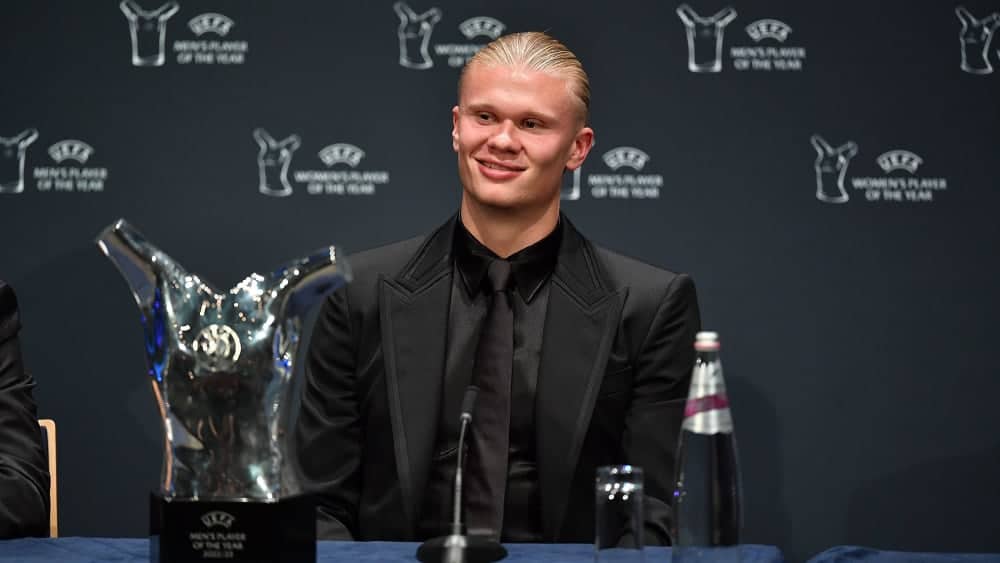UEFA will no longer honor Europe’s male and female footballers of the year. Instead, the continental association will join the Ballon d’Or
This move, announced by UEFA on Friday, is another piece in the mosaic of UEFA’s competition with FIFA at all levels, especially in marketing.
Since 1956, the “masters” of the Ballon d’Or (Golden Ball) and the World Player of the Year award have often alternated and competed. In the recent past, FIFA has increasingly promoted its own choice of world footballers, parallel to the Ballon d’Or, which also aims to honor the world’s best and is the format with the greatest tradition.
At the same time, UEFA has been honoring the best players and coaches in Europe since 2011. That has now come to an end. As early as 2024, these awards will be merged into the Ballon d’Or “that the best in the world play in the European leagues and thus in the Champions League anyway.”
UEFA wants to position a counter-draft to FIFA’s world footballer election
At the beginning of this week, however, the result of the Ballon d’Or was quite different: Lionel Messi had been voted for the eighth time. However, the Argentinian world champion now plays in the North American professional league MLS.
It is obvious that with the Ballon d’Or, UEFA wants to position and strengthen a counter-design to FIFA’s World Player of the Year award. The rights to the Ballon d’Or are held by the French Amaury Group, which owns the media brands “L’Equipe” and “France Football”, the actual mother of the Ballon d’Or.
According to the press release, UEFA and Groupe Amaury have now agreed that the French will remain the owner of the Ballon d’Or brand and will continue to oversee the voting system. UEFA aims to market the worldwide commercial rights and organize the annual awards gala.
The men’s and women’s coach of the year awards, which UEFA had introduced at its own level, are to be retained and now represent a small dowry to further expand the Ballon d’Or, which has recently been inflated with various additional sub-categories.
The Ballon d’Or is to become “a global event “
This is now to become “a global event”, the Amaury Group has announced. UEFA President Aleksander Ceferin recalled that the European Champion Clubs’ Cup, the predecessor to the Champions League, was more or less invented by the French.
Gabriel Hanot and Jacques Ferran worked at “L’Equipe” and “France Football” and, together with their colleagues Jacques van Ryswick and Jacques Goddet, the later director of the Tour de France, had two ground-breaking ideas. In 1955, they invented the European Cup of National Champions. In 1956, they created a prize for Europe’s best player: the Ballon d’Or. Until 1994, the prize could only be won by a European player. It was only then that the competition was opened up to non-Europeans, provided they were under contract with a European club. From 2007, the scope of the Ballon d’Or was broadened to recognize the best footballer in the world.
At this time, however, there was already an election for world footballer. FIFA, Adidas and the European Sports Media (ESM) association, organized and ran this award. The first award was presented to Lothar Matthäus in 1991
Haaland remains the last winner of Europe’s Footballer of the Year
From 2010 to 2015 (four times Lionel Messi, twice Cristiano Ronaldo), there was only one world footballer because the world governing body and the French company joined forces to create a “FIFA Ballon d’Or”. However, a dispute was followed by a split – since then, two world footballer elections have been held again.
In 2011, a footballer of the year was chosen specifically in Europe for the first time, and his name was Messi. This award was the result of an initiative by Holzschuh and the then UEFA President Michel Platini. The most recent winners, at the end of August, were Erling Haaland and Aitana Bonmati.
The awards for these stars and their predecessors, including Franck Ribery (2013), Virgil van Dijk (2019) for the men and Nadine Angerer (2013), Nadine Keßler (2014) and Celia Sasic (2015) for the women, have traditionally been presented as part of the Champions League draw, but have not been specially marketed to date.





